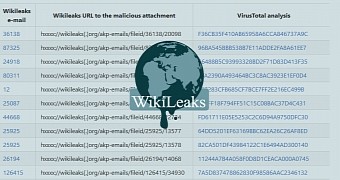The WikiLeaks dump of emails stolen from the server of AKP, Turkey's ruling party, contains hundreds of links to downloadable malware, Bulgarian security researcher Vesselin Bontchev has discovered.
The researcher, who works at the National Laboratory of Computer Virology at the Bulgarian Academy of Sciences in Sofia, Bulgaria, has created a script that parsed the WikiLeaks AKP email data dump for links and sent them for scanning via VirusTotal's API.
Bontchev initially discovered around 80 links pointing to malware downloads, which he presented in a report he later amended and now lists 323 samples.
WikiLeaks dumped every email, including spam
The links Bontchev's script scanned are contained in the emails AKP party members have received and were later stolen by a hacker called Phineas Fisher.
Most of these are spear-phishing emails, often pointing to RATs (Remote Access Trojans), but most of the time to ordinary malware such as malware droppers, password stealers, and ransomware.
Bontchev's report includes the WikiLeaks ID, the link of the malicious attachment, and a link to a VirusTotal report.
Reporters and investigators are at risk
The researcher also says that he initially didn't scan the files found in the spam folders. A subsequent scan revealed over 962 malicious attachments and 2,093 if including duplicate emails.
More surprising is that the researchers scanned only for emails containing file attachments in the form of DOCM files. The total number of malware links included in the WikiLeaks AKP dump is most likely much, much larger.
The danger is that reporters and investigators looking into the AKP emails might download malware that infects their computers. If they download ransomware, their work will be seriously delayed as they deal with the infection.
WikiLeaks abandoned any trace of professionalism in the past month
Since mid-July, after it dumped the AKP emails and the DNC hack files, WikiLeaks has been under heavy criticism because of the unprofessional way it handled these files.
First, the hacker who broke into the AKP email servers to steal the data accused WikiLeaks of rushing to dump the files, even if he was not yet ready to do so and was still inside the AKP servers.
After the AKP dump was published, WikiLeaks came under heavy fire from women's rights groups who accused the organization of not taking the time to screen the files for personal data.
WikiLeaks has two incidents under its belt where it dumped personal data
Many high-profile figures, such as Zeynep Tufecki, a US citizen of Turkish origins, revealed that WikiLeaks had published the personal information on all Turkish women voters from 79 out of the 81 Turkish provinces.
Tufecki argued that these women may now be in danger from extreme Islamist groups who think women should not be allowed to drive, let alone vote.
But the WikiLeaks criticism didn't stop here. A week later, after the organization leaked the data stolen by Guccifer 2.0 in the DNC hack, US privacy organizations pointed out that WikiLeaks, once again, had not sanitized the data, which contained a plethora of personal information from US and foreign citizens who had donated funds to the Democratic Party.
Even Edward Snowden criticized the organization, calling out its "modest [data] curation" efforts.
Criticism is mounting against WikiLeaks from all sides, as the organization seems to have turned into a run-of-the-mill data dump site, instead of an organization with a higher purpose.
LOL. If you thought my report about malware hosted by Wikileaks was bad stuff, keep in mind I didn't look in the spam e-mails. — Vess (@VessOnSecurity) August 14, 2016
Took a peek now. Hooo, boy! Normally, 84 malicious DOCM attachments. Include spam? 962. Include duplicates? 2093. And that's just DOCM. — Vess (@VessOnSecurity) August 14, 2016
I dread to think how much more malware is included with other extensions. Man, what a mess. :( — Vess (@VessOnSecurity) August 14, 2016
Link to the script:https://t.co/vN5HF6vMu5Haven't looked at the spam myself, but almost certainly the attachments there are all malware. — Vess (@VessOnSecurity) August 14, 2016

 14 DAY TRIAL //
14 DAY TRIAL //